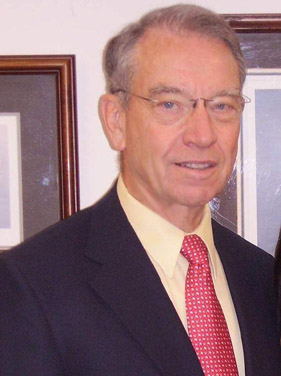 As Americans count their blessings during this season of thanksgiving, many of us can be thankful to gather around the holiday table with multiple generations of family and friends. More Americans are enjoying greater longevity and an improved quality of life well beyond retirement. In 21st century America, the bar of expectation has been raised for each successive generation not only to live the American Dream, but also to live longer and healthier than those before us. Many of us can thank modern medicine for creating breakthrough cures and treatments.
As Americans count their blessings during this season of thanksgiving, many of us can be thankful to gather around the holiday table with multiple generations of family and friends. More Americans are enjoying greater longevity and an improved quality of life well beyond retirement. In 21st century America, the bar of expectation has been raised for each successive generation not only to live the American Dream, but also to live longer and healthier than those before us. Many of us can thank modern medicine for creating breakthrough cures and treatments.
As the taxpaying public shoulders a growing share of the nation’s health care spending, it’s important now more than ever to protect the integrity of each tax dollar and strengthen the integrity of the U.S. health care system.
That’s why I’ve focused for the last several years to improve transparency and accountability between health care providers and the pharmaceutical and medical device industries.
In 2004 I began an inquiry regarding the financial ties between Food and Drug Administration advisory board members and the drug industry. Later, I broadened my scope to include the National Institutes of Health in order to assess its effectiveness in monitoring conflicts of interest between the industry and medical researchers.
It became clear more transparency was needed. In my work in public office, I’ve found sunshine to be very effective in revealing problems and promoting good behavior.
Starting in 2007, I led a bipartisan legislative effort to bring transparency to the financial relationship between drug and medical device makers and doctors conducting research or practicing medicine. My “Physician Payments Sunshine Act,” which became law this year as part of health care reform, will require all payments above $10 from drug and device makers to physicians to be reported every year by the drug or device company. A user-friendly data base will be available to the public, so that anyone can see industry payments to physicians prescribing treatments and medical researchers conducting studies whose outcomes can significantly influence the commercial success of a drug or device.
The pharmaceutical industry spends tens of billions of dollars every year to market its products to providers. Some physicians receive industry payments for speeches, consulting activities, travel and research. While these payments are often a good and necessary part of drug development, they can also create bad behavior when kept hidden from the public.
In the past few years, congressional investigations and state gift disclosure laws have raised eyebrows about these financial connections, especially where the amount that has been publicly reported is vastly less than what has actually been paid. For example, a congressional review I led from my position on the Senate Finance Committee revealed a troubling financial link between a drug maker and a child psychiatrist at Harvard, whose work led to a significant spike in diagnoses of pediatric bipolar disorders and prevalent use of antipsychotic medicines for children.
Separately, an orthopedic surgeon at the University of Wisconsin received more than $19 million from a medical device company, although he reported only receiving “more than $20,000” per year on his financial disclosure records to the university.
My sunshine legislation that’s now law will require the pharmaceutical and device industries to collect information on their payments to physicians beginning in 2012 and submit it to the Department of Health and Human Services by March 2013 and annually thereafter. The Department of Health and Human Services is required to make that payment information available to the public starting in September 2013. Some within the industry already are developing self-reporting requirements in response to the effort.
While I’m glad to see companies, manufacturers, universities and even the National Institutes of Health are getting a head start to increase disclosure, I’m concerned the information could create even more confusion because the data is not standardized.
That’s why I am working closely with the Department of Health and Human Services to ensure the implementation of the sunshine law works as intended. That means the data must be made available in a timely, user-friendly format.
This effort has been part of my continued work to build openness and establish accountability for taxpayers. Banning anonymous “holds” in the U.S. Senate would shine the light of day on lawmakers who delay the people’s business. I’ve said lawmakers who take issue with a specific bill or nomination ought to have the guts to stand up and say so.
Likewise, creating a meaningful database of financial ties between Big Pharma and medical researchers ought to strengthen our health care system. Financial ties should withstand the light of day.


SHARE YOUR STORY/COMMENT